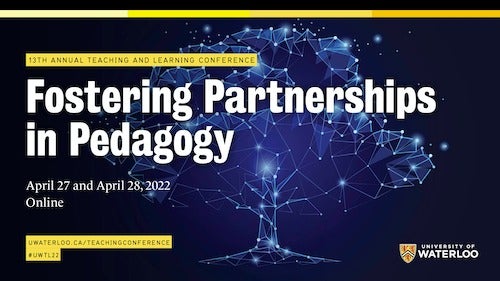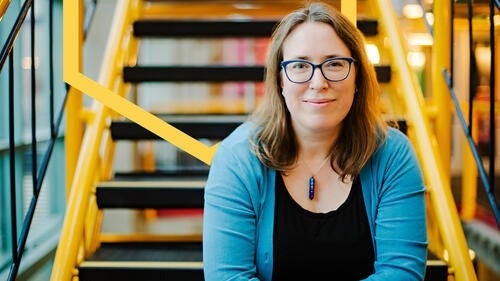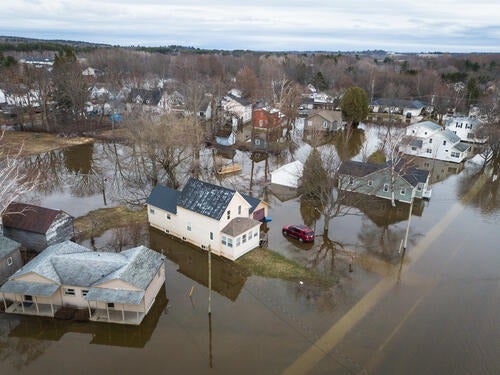Editor:
Brandon Sweet
University Communications
bulletin@uwaterloo.ca
Quantum Quest Seed Fund call for proposals

The Transformative Quantum Technologies (TQT) program has opened another call for proposals for the Quantum Quest Seed Fund (QQSF). The funding opportunity opened February 14, 2022.
The research focus area for the funding proposals includes the development of new ideas and applications for quantum devices. Proposals are encouraged that articulate the use of quantum properties in existing systems including superposition, tunneling, entanglement in applications, and the development of new systems that display quantum properties.
Each project must have only one Lead Principal Investigator (PI). The PI shall have an existing tenure-track appointment within one of Waterloo’s Faculties. Collaborations with other researchers are permitted. Proposals are encouraged that originate from investigators new to the quantum community. To comply with the Canada First Research Excellence Fund (CFREF) award administration, QQSF will only accept applications that do not replace or displace the funding that is available through Tri-Council agency’s regular programming.
Investigators are encouraged to explore collaborations with the three quantum programs supported by CFREF (UW TQT, Universite de Sherbrooke Institut Quantique and UBC Stewart Blusson Quantum Matter Institute). Applicants have the option of selecting “joint CFREF project” in the application form, and completing the requisite details. For joint projects, preference will be given to proposals that effectively combine the complementary strengths from the different programs. UWaterloo Principal Investigators shall complete the application and budget for the research activities they are responsible for on the joint project; these activities will be funded directly by TQT. Report requirements are detailed in the Acknowledgement.
Funding decisions for this program will be made by the Quantum Quest Seed Fund Committee comprising representation from Math, Science and Engineering. Successful proposals will be notified in April.
The QQSF provides funding in the amount of up to $50,000 per year for a two-year period. Projects funded under QQSF are expected to lead to other sources of follow-on external funding.
Please refer to the Guidelines to access the application documents: https://tqt.uwaterloo.ca/opportunities/quantum-seed/.
The application process involves completion and submission of the Application Form (includes Budget Justification), Budget Worksheet, Acknowledgement, Principal Investigator’s CV, and the UW Coversheet for Sponsored Research.
The submission deadline is Friday March 11, 2022 at 5:00 p.m. Late or incomplete submissions will not be accepted.
Registration now open for the Teaching and Learning Conference

A message from the Centre for Teaching Excellence (CTE).
Registration is now open for our 13th annual University of Waterloo Teaching and Learning Online Conference taking place on April 27-28, 2022. Last year saw over 500 faculty members, staff, and students gather to learn from and with one another around the theme of learning through assessment in our learners and approaches to teaching. Our 2022 conference theme is Fostering Partnerships in Pedagogy.
We are excited to welcome Alison Cook-Sather, Mary Katharine Woodworth Professor of Education at Bryn Mawr College and Director of the Teaching and Learning Institute at Bryn Mawr and Haverford Colleges, as our keynote speaker, as well as Sean Geobey (Assistant Professor in Social Innovation and Social Entrepreneurship in the University of Waterloo's School of Environment, Enterprise and Development (SEED)) and Diana Skrzydlo (Continuing Lecturer in the Department of Statistics and Actuarial Science, the Math Faculty Teaching Fellow, and the current Director of the MActSc program in the University of Waterloo), who will each recreate a successful instructional approach in our Igniting Our Practice plenary session, which showcases some of the excellent teaching being done on our campus.
The registration deadline is Monday, April 25, 2022.
Artificial Intelligence with human understanding

By Melanie Scott. This article was originally published on Waterloo News.
Whether it’s a digital assistant, like Siri, predictive text, social media or a vehicle with autonomous functions, many of us use or rely on some form of Artificial Intelligence (AI) daily.
Within the next few years, AI systems will become even more complex in their interactions with people and other AI agents. We’ll see evidence of this in fields such as consumer and financial markets, law, cybersecurity and health care. Kate Larson, a professor in the David R. Cheriton School of Computer Science, and her colleagues have argued that if AI does not engage well with humans, it could fail to deliver benefits. “There are ongoing issues of ethics, regulation and privacy,” she says. “If we don’t design AI systems people can trust, there will be a backlash.”
Larson conducts research on Multiagent Systems — AI systems that interact with one another — and recently collaborated on a research paper discussing the need for co-operative AI.
Co-operative AI refers to the ability of AI agents to work alongside or with other AI agents or people. It can also refer to AI that is used to better support teamwork and collaboration.
A need for AI with social understanding
Although it is used by billions of people daily, AI has limited understanding when it comes to interacting with humans and other agents. Early multi-agent research focused on AI that learns to beat an opponent — for example in two-player zero-sum games such as chess or Go. “This is a start, but it is not how the world works,” Larson says. “We need to look at how to change the questions and approaches we are taking when designing AI, so that we have a stronger focus on co-operative intelligence.”
Already, there is a need for AI that has social understanding and can interact with others. Autonomous vehicles, for example, are not driving in isolation. They’re driving alongside pedestrians, cyclists and other vehicles, and have human operators. We train them through simulations to show them the correct way of behaving to keep people safe.
“We’re seeing some unintended consequences of AI that doesn’t have social understanding,” Larson says, referencing social media algorithms that have contributed to the spread of misinformation. “Algorithms like these are meant to improve user engagement, but this may not be the metric we want to focus on. If we began AI design by thinking about cooperation and social factors, we might be able to better think through potential ramifications, rather than trying to reverse or fix negative societal or human impact later.”
AI research at Waterloo
Larson, who is a University Research Chair and was also appointed a Pasupalak AI Fellow, has always been interested in group dynamics and organizing groups of people to complete projects or take meaningful action. She is currently collaborating with other researchers on a climate change project that uses AI to predict wildfires and support their reduction and control.
She also supervises students who are interested in building and researching teams of AI agents and studying how they can learn to cooperate within their team, as well as students who look at using ideas from machine learning to learn better ways of voting.
Waterloo has a multitude of AI researchers, groups and initiatives, including the Waterloo Artificial Intelligence Institute and the Artificial Intelligence Group. Larson is a member of both groups and believes there are many opportunities available on campus for further exploration of co-operative AI and interdisciplinary collaboration on the topic.
The future of co-operative AI
“There has been a revolution of interest in AI in the last decade,” Larson says. “AI has moved from research and labs and has become integrated into many facets of our society.”
Larson and her colleagues believe that co-operative AI is unlikely to emerge as a by-product of AI research and needs its own field of study. They warn that progress toward socially valuable AI will be stunted unless cooperation is at the centre of the research. To successfully build and design AI models that have social understanding and can truly benefit humanity, AI researchers will need to co-operate themselves across a variety of disciplines and fields.
“If we are going to make positive advances, we will have to take an interdisciplinary approach,” Larson says. “We’ll need to work closely with those in other fields, such as psychology, philosophy, law and policy, history and sociology. It’s essential to work alongside researchers that study and understand co-operation.”
Homes sell for 8.2 per cent less after catastrophic floods

Flooding has pushed down housing prices in communities across Canada.
New findings show that over the past eight years, catastrophic flooding in communities resulted in an average 8.2 per cent reduction in the final sale price of houses, 44.3 per cent reduction in the number of houses listed for sale, and 19.8 per cent more days on the market to sell a house.
These findings are presented in a new report from the Intact Centre on Climate Adaptation, University of Waterloo. The study focuses on five Canadian cities, each of which had experienced catastrophic flooding between 2009 and 2020: Grand Forks, B.C.; Burlington, Ontario; Toronto; Ottawa; and Gatineau, Que.
The impact of flooding was measured for periods of six months before and after flood events. Attribution of flood impacts was determined by comparing changes in nearby non-flooded control communities over identical time frames.
“The findings of this report do not surprise me,” said Gary Will of Will Davidson LLP, a firm that advises on flood risk. “They underscore the impact on housing prices and the need to actively reduce flood risk through updated flood plain modelling and mapping, and to re-think development, without delay, as flooding affects everyone from planners, homeowners to government decision-makers.”
The study also examined the impact of community-level flooding on mortgage arrears and deferrals in two Canadian cities for six months pre and post flooding. Results showed no change in homeowners’ ability to pay their mortgage, but a reduction in the appraised value of a house due to flooding would influence limits on lending by mortgage providers.
As noted by Steve Mennill, Chief Climate Officer, Canada Mortgage and Housing Corporation (CMHC), “For most homeowners, their house is their biggest financial investment. As this report clearly shows, an all-of-society effort to protect that investment from the growing threat of flooding would be of great benefit to many Canadians.”
Study co-author Dr. Blair Feltmate said, “Canada must learn to manage flood risk, rather than chase it. Recognizing that residential flooding is the most costly and pervasive impact of extreme weather, municipal planners should double-down on ensuring that adaptation factors into community design.”
Actions recommended in the report to give Canadians guidance to limit flood risk include:
Home flood protection guidance: Municipalities, banks, insurers and real estate associations should distribute guidance to homeowners on means to lower the risk of basement flooding.
Climate Adaptation Home Rating Program (CAHRP): The federal government should link the CAHRP to EnerGuide home energy audits.
Flood risk maps: The federal government should update flood risk maps and ensure they are publicly accessible.
Residential flood risk scores: The federal government should develop a home flood-risk scoring system based on postal code (as already exists in the US).
Natural infrastructure: All governments should commit to retaining and restoring natural infrastructure (forests, grasslands, wetlands) to limit current and future flood risk.
Community flood risk mitigation: Communities should act now to identify and protect areas at high risk of flooding.
Canada has the tools necessary to mitigate flood risk, today. If these tools are not mobilized, with a sense of urgency, flood disasters as seen on Canada’s west and east coasts in November 2021 will be increasingly commonplace.
Thursday's notes
The latest WaterTalk featuring David Sedlak will take place today at 1:00 p.m. and is entitled The Next Water Revolutions.
"Climate change, development and an underinvestment in water infrastructure are increasing stress on water systems worldwide," says the talk's abstract. "Although some of the world’s water problems can be addressed by employing existing technologies and policy reforms, there are opportunities to develop new approaches to water treatment and management that can address water scarcity, escalating costs and environmental impacts. This talk will describe the current status of water systems and opportunities from researchers to be part of a revolution in the way that water is treated and managed."
David Sedlak is the Plato Malozemoff Professor in the Department of Civil & Environmental Engineering at UC Berkeley where he is the Director of the Berkeley Water Center and Deputy Director of the NSF engineering research center for Reinventing the Nation’s Urban Water Infrastructure (ReNUWIt).
At 1:30 today, the Interdisciplinary Centre on Climate Change will host Climate Change Communications: Research spotlight with Ashley Rose Mehlenbacher. "How we talk about climate change can shape how we take action to address it," says a note from IC3. "Join Ashley Rose Mehlenbacher alongside Sara Doody and Carolyn Eckert for our first research spotlight of 2022. They’ll share their research focusing on communication strategies that make a climate impacted future more present, thus generating climate action. They will also discuss research about how we might think and talk about responsibility to future generations and how this might shape our climate actions."
Finally today, Research Talks with The Right Honourable Michaëlle Jean, entitled “Black History is World History: From Moment to Global Movement,” is set to take place from 3:00 p.m. to 4:30 p.m. Registration is required.
Upcoming office closure
Campus Wellness locations will be closed today from 8:30 a.m. to 11:30 a.m. due to an all-staff meeting.
Link of the day
Women's hockey team takes Olympic gold
When and Where to get support
Students can visit the Student Success Office online for supports including academic development, international student resources, immigration consulting, leadership development, exchange and study abroad, and opportunities to get involved.
Instructors looking for targeted support for developing online components for blended learning courses, transitioning remote to fully online courses, revising current online courses, and more please visit Agile Development | Centre for Extended Learning | University of Waterloo (uwaterloo.ca).
Instructors can visit the Keep Learning website to get support on adapting their teaching and learning plans for an online environment.
Course templates are available within your course in LEARN to help you build and edit your content and assignment pages quickly.
The following workshops, webinars, and events are offered by the KL team (CTE, CEL, ITMS, LIB):
- Independent Remote Course Design Essentials, self-directed, continuous self-enrollment course in LEARN.
- Independent Blended Course Design (iBlend), self-directed, ongoing
- Copyright Overview for Waterloo Instructors and Staff - self-directed, continuous self-enrollment course in LEARN.
- Thirty Minute Thursdays - PebblePad - Offered: February 17, March 3, and 10, 12:00 noon - 12:30 p.m.
Employees can access resources to help them work remotely, including managing University records and privacy of personal information. Here are some tips for staying healthy while working from home.
The Writing and Communication Centre has virtual services and programs to help undergrads, grad students, postdocs and faculty members with academic writing.
- Meet with writing advisors in one-to-one appointments to brainstorm, draft, revise, and polish. No time for an appointment? Try email tutoring for undergrads.
- Beat isolation and make writing progress at weekly Virtual Writing Cafés for grad students and faculty or PJ-Friendly Writing Groups for Undergrads.
- Take an online workshop or apply to our popular Dissertation Boot Camp program.
- Faculty can request custom in-class workshops for their courses, or the WCC can facilitate any existing workshops for student groups.
- Course-integrated support available. Attention faculty and instructors: The application form for Writing and Communication Centre course-integrated support is now available online. We offer five unique support streams for your courses including synchronous and asynchronous workshops and monitored discussion boards.
Co-op students can get help finding a job and find supports to successfully work remotely, develop new skills, access wellness and career information, and contact a co-op or career advisor.
The Centre for Career Action (CCA) is currently offering virtual services only. Questions about CCA's services? Live chat or call 519-888-4047 between 8:30 a.m. and 4:30 p.m. EST, Monday to Friday.
Drop-in to Warrior Virtual Study Halls on Wednesdays from 5:30 p.m. to 7:00 p.m. Come together in this virtual space to set goals and work independently or in groups each week.
Renison's English Language Institute continues to offer virtual events and workshops to help students practice their English language skills.
If you feel overwhelmed or anxious and need to talk to somebody, please contact the University’s Campus Wellness services, either Health Services or Counselling Services. You can also contact the University's Centre for Mental Health Research and Treatment. Good2Talk is a post-secondary student helpline available to all students.
The Library is open with expanded hours for access to book stacks, drop-in individual study space, bookable group study rooms, drop-in access to computers and printers, book pick-up services and IST Help Desk support. Librarian consultations, Special Collections & Archives and the Geospatial Centre are available by appointment. Full details on current services and hours are available on the Library’s COVID-19 Update webpage.
The Faculty Association of the University of Waterloo (FAUW) continues to advocate for its members. Check out the FAUW blog for more information.
The University of Waterloo Staff Association (UWSA) continues to advocate for its members. Check out the UWSA blog for more information.
The Sexual Violence Prevention and Response Office (SVPRO) supports all members of the University of Waterloo campus community who have experienced, or been impacted, by sexual violence. This includes all students, staff, faculty and visitors on the main campus, the satellite campuses, and at the affiliated and federated Waterloo Institutes and Colleges. For support, email: svpro@uwaterloo.ca or visit the SVPRO website.
The Office of Indigenous Relations is a central hub that provides guidance, support, and resources to all Indigenous and non-Indigenous campus community members and oversees the University's Indigenization strategy.
The Waterloo Indigenous Student Centre, based at St. Paul’s University College, provides support and resources for Indigenous students, and educational outreach programs for the broader community, including lectures, and events.
WUSA supports for students:
Peer support - MATES, Glow Centre, RAISE, Women’s Centre - Visit https://wusa.ca/peersupport to book an appointment either in person or online for the Fall term.
Food Support Service food hampers are currently available from the Turnkey Desk 24/7 in the Student Life Centre. Drop off locations are also open again in SLC, DC, DP, SCH and all residences.
Co-op Connection all available online. Check https://wusa.ca for more details.
Centre for Academic Policy Support - CAPS is here to assist Waterloo undergraduates throughout their experience in navigating academic policy in the instances of filing petitions, grievances and appeals. Please contact them at caps@wusa.ca. More information is available.
WUSA Student Legal Protection Program- Seeking legal counsel can be intimidating, especially if it’s your first time facing a legal issue. The legal assistance helpline provides quick access to legal advice in any area of law, including criminal. Just call 1-833-202-4571.
Empower Me is a confidential mental health and wellness service that connects students with qualified counsellors 24/7. They can be reached at 1-833-628-5589.
GSA-UW supports for graduate students:
The Graduate Student Association (GSA-UW) supports students’ academic and social experience and promotes their well-being.
Advising and Support - The GSA advises graduate students experiencing challenges and can help with navigating university policies & filing a grievance, appeal, or petition.
Mental Health covered by the Health Plan - The GSA Health Plan now has an 80% coverage rate (up to $800/year) for Mental Health Practitioners. Your plan includes coverage for psychologists, registered social workers, psychotherapists, and clinical counselors.
Dental Care - The GSA Dental Plan covers 60 per cent to 70 per cent of your dental costs and by visiting dental professionals who are members of the Studentcare Networks, you can receive an additional 20 per cent to 30 per cent coverage.
Student Legal Protection Program - Your GSA fees give you access to unlimited legal advice, accessible via a toll-free helpline: +1-833-202-4571. This advice covers topics including housing disputes, employment disputes, and disputes with an academic institution.
The Graduate House: Open Monday to Friday 11:30 a.m. to 6:00 p.m. - We’re open to all students, faculty, staff, and community members. The Graduate House is a community space run by the GSA-UW. Capacity is limited to 50 per cent, and Government ID and Vaccination Records will be required for all dine-in guests. Graduate students who paid their fees can still get discounts and free coffee.
When and Where (but mostly when)
Warriors vs. Laurier Blood Donation Battle. Join our “Waterloo Warriors” team on the Blood.ca website or app. #ItsInYouToGive
Healthy Warriors at Home, free online programs including Nutrition Guides, Personal Training Consults, Health Webinars, Mindfulness Courses and On-demand Fitness. Sign up now.
GSA-UW presents Safe Love Week 2022, Monday, February 14 to February 18.
Research Talks with The Right Honourable Michaëlle Jean, “Black History is World History: From Moment to Global Movement,” Thursday, February 17, 3:00 p.m. to 4:30 p.m. Registration is required.
WaterTalk: The Next Water Revolutions, presented by David Sedlak, Thursday, February 17, 1:00 p.m.
Climate Change Communications: Research spotlight with Ashley Rose Mehlenbacher, Thursday, February 17, 1:30 p.m.
WISE Public lecture webinar, “Decarbonization Strategies in Canada: Challenges and Future Prospects,” Friday, February 18, 11:00 a.m. to 12 p.m., Zoom.
NEW - Warrior Rec Think Pink Glow in the Dark Zumba, Thursday, February 17, 6:00pm (PAC Studio 3). Free class with donations being accepted to support the Canadian Cancer Society. Register now.
FASS Theatre Company presents FASS-o-VISION, Friday, February 18 and Saturday, February 19, 8:00 p.m., performed live via YouTube.
NEW - Warriors Basketball vs. Laurier, Friday, February 18, 6:00 p.m. and 8:00 p.m., Battle of Waterloo, Mike Moser Day, Employee Day, Think Pink, Residence Day. Free tickets available for staff and faculty sponsored by Homewood Suites St. Jacobs. Purchase your tickets today.
NEW - Women's Hockey vs. Brock, Tuesday, February 22, 7:00 p.m.,Think Pink in support of the Breast Cancer Cause at the Canadian Cancer Society. Purchase your tickets today.